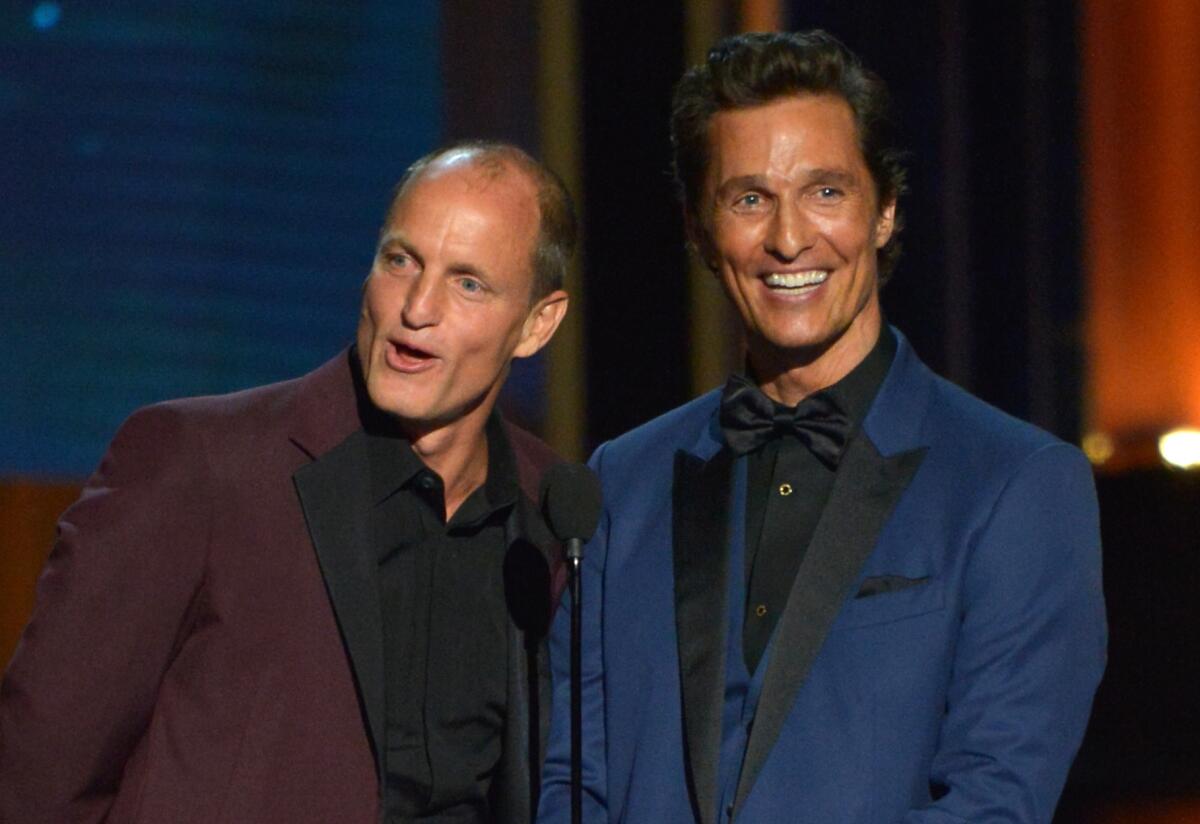The opening scene unfolds onto a bird’s-eye view of a sedan making its way down a stretch of unmarked highway, as Woody Harrelson’s unmistakable drawl is heard off-camera. “You ever wonder if this industry of ours is just chasing its own tail?” he asks.
Matthew McConaughey, in his equally distinctive cadence, shoots back, “No, I don’t wonder. Restrictions, regulations, nickel and diming productions, political lectures,” before the camera pans in for a close-up of the actors.
The sequence pays homage to the gritty, atmospheric crime drama “True Detective.” Indeed, it was directed by Nic Pizzolatto, the show’s creator.
Woody Harrelson and Matthew McConaughey have played major roles in the effort to increase Texas film incentives.
(Lester Cohen / WireImage)
In January, this four-minute video, “True to Texas,” was released as part of an unusual campaign by a coalition of A-list actors — Dennis Quaid, Renée Zellweger and Billy Bob Thornton make appearances — independent creatives and Lone Star Republicans to appeal to the Texas State Legislature.
The goal: to help bring increased film incentives to a state not known for its wholesale embrace of Hollywood or government subsidies — particularly for something like the arts.
Despite considerable push back among conservative lawmakers, the effort paid off. Last month Gov. Greg Abbott allowed the passage of an unprecedented bill boosting tax incentives for film production in the state to $300 million every two years — guaranteeing that funding for 10 years. The law goes into effect Sept. 1.
The aggressive bid to nab a slice of Hollywood furthers the ongoing rivalry between California and Texas. Several major Golden State-based companies including Tesla and Hewlett-Packard have relocated to the Lone Star State, lured by lower taxes and its business-friendly environment. It also comes as California is struggling to keep movie and TV production, having recently doubled its own tax incentive ceiling to compete with film subsidies in three dozen other states and abroad.
The new bill puts Texas in a position to become a major player among the growing list of global and regional filming hubs in an industry that has become increasingly unmoored from its historic Hollywood hometown.
“Texas now has a program that is going to be competitive,” said Fred Poston, the executive director of the Texas Media Production Alliance. “When you really take a close look at it, you realize this is a big deal. We have this new level of funding to start building more industry around it.”
The Texas bill is not only bigger and better, but found itself an unlikely champion in Republican Lt. Gov. Dan Patrick.
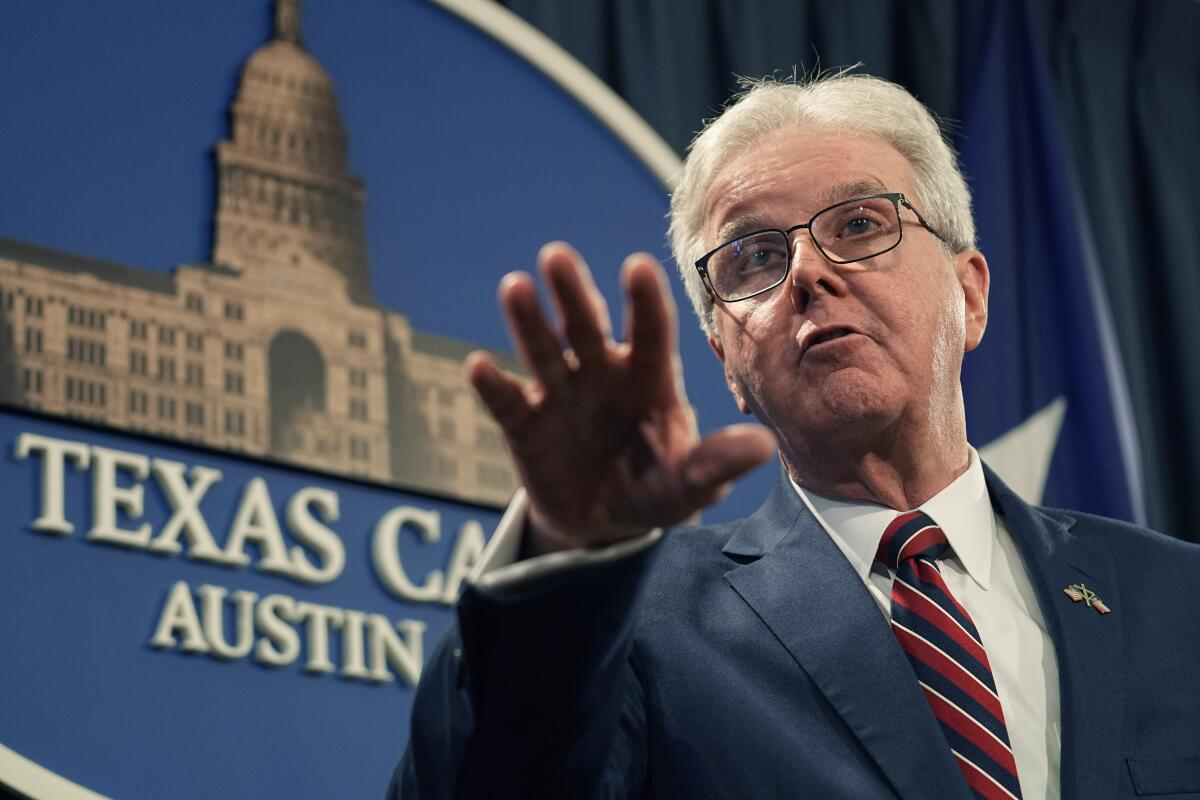
Texas Lt. Gov. Dan Patrick wants to make his state the world’s film capital.
(Eric Gay / Associated Press)
“We are not trying to make Texas the next Hollywood — we don’t like Hollywood. We want to export Texas values,” said Patrick in a campaign update. A staunch conservative who has relentlessly opposed legalized marijuana, gambling and abortion, Patrick has vowed “to make Texas the Film Capital of the World.”
The bill, which supports the Texas Moving Image Industry Incentive Fund (TMIIF) program, offers tiered grants up to 25% for projects spending $1.5 million in the state. Faith-based films and those that shoot in historic sites or employ a percentage of crew who are Texas-based military veterans can push grants up to 31%.
The governor’s office, through the film commission, has broad discretion over which projects receive funds and awards can be denied at any stage in the review process for material that portrays Texas negatively or contains “inappropriate” content.
Conservative backlash
Still, even with the bill’s Texas-style protectionist wrangling, its passage was far from assured.
Weeks before the Senate vote, there was hand-wringing among conservative lawmakers and others who opposed the bill on economic, moral and even biblical grounds. Critics took swipes at profanity-laced scripts and what they saw as inaccurate portrayals of the state’s oilmen on TV. Some viewed the grants as akin to taxpayer theft. Many shuddered at the thought that the bill would usher in the unholy influence of a debauched Hollywood on Texas.
“The Bible warns us of the consequences of the government wrongfully taking money from some and handing it out to others,” said the Texans for Fiscal Responsibility in one of several papers it published decrying the bill.
Republican State Rep. Brian Harrison called the bill “an abomination. And shame on everybody who voted for it.”
Harrison launched his own “Don’t Hollywood My Texas” crusade.
One of his followers, the Freedom Bard, a self-proclaimed “patriotic” lyricist, recorded an earworm of a protest anthem denouncing the bill with such lyrics as: “Keep your failed policies and your liberal BS.”
“This is big government liberal redistributive socialism,” Harrison told The Times, “The governor and lieutenant governor of the supposedly Republican-controlled state of Texas chose to keep property taxes billions of dollars higher so that you can subsidize a rich liberal Hollywood movie industry — how embarrassing.”
He plans to introduce legislation at a special hearing later this month to repeal the law.
The ‘Third Coast’
Despite the hostility toward Hollywood, Texas was once known as the film industry’s “Third Coast.”
Many of the westerns of the 1920s and ‘30s were filmed in the state.
Texas’ sweeping backdrops and larger-than-life characters have inspired some of the most celebrated movies and television shows, including the 1956 epic “Giant,” the 1974 slasher classic “The Texas Chainsaw Massacre,” the 1990 sleeper hit “Slacker” and the acclaimed small-town TV series “Friday Night Lights.”
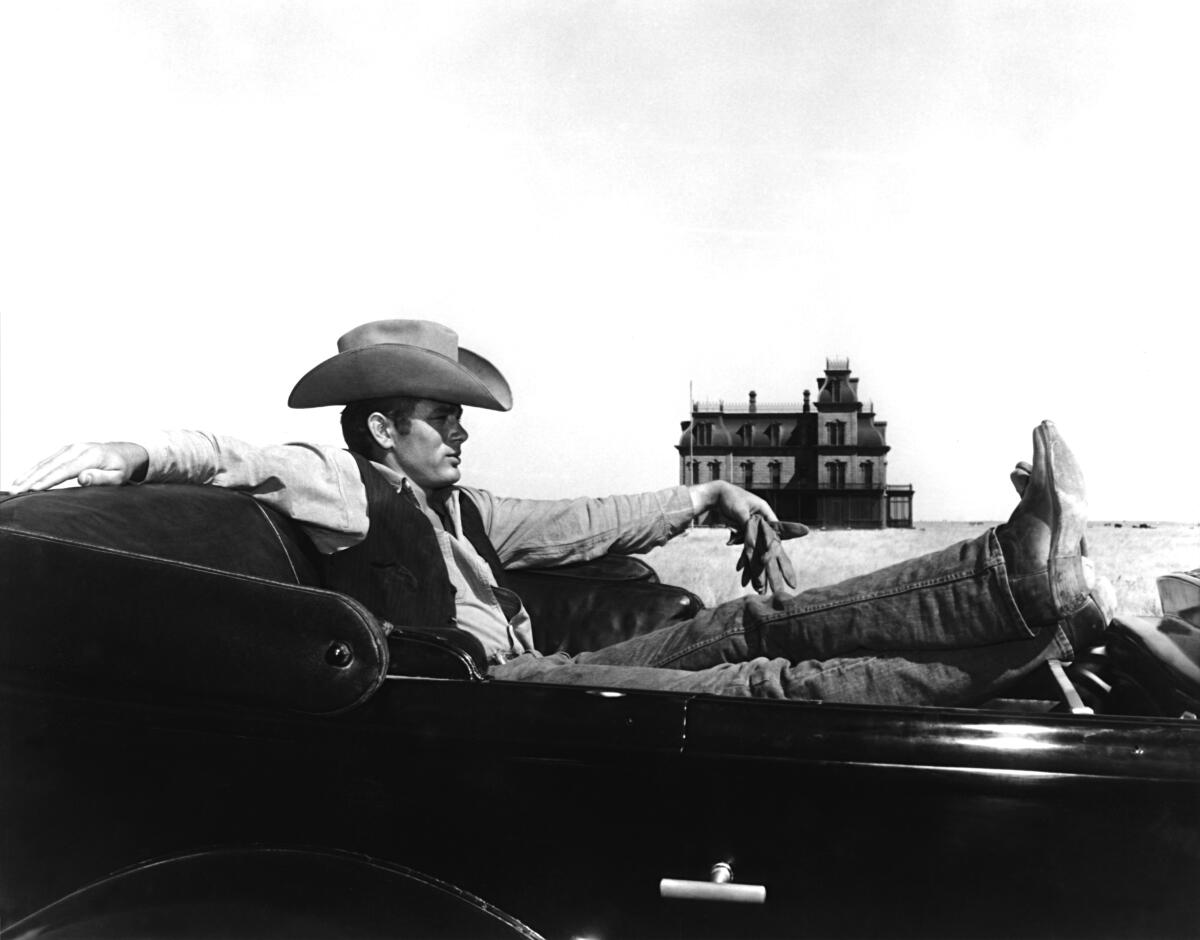
The 1956 classic “Giant,” starring James Dean, was primarily shot in Texas.
(Warner Bros. / TCM)
The state’s cultural soil has nurtured a fertile creative community with filmmakers like Robert Rodriguez (“El Mariachi”), Wes Anderson (“Bottle Rocket”) and Richard Linklater (“Boyhood”).
By the early 2000s, however, neighboring states began chipping away.
“Texas had been highly competitive, we had all of these ingredients,” said Rebecca Campbell, CEO of the Austin Film Society. “Then all of a sudden, Texas stories were getting shot in New Mexico and Louisiana.”
In 2007, the state established its first program for film incentives, earmarking $20 million. Although the program expanded in later years, it became chronically underfunded, prompting the producers of “Fear the Walking Dead” in 2021 to relocate to Georgia after filming four seasons around Austin.
Linklater had to rework his 2024 romantic crime thriller “Hit Man” starring Glen Powell, originally set in Houston, when filming relocated to New Orleans because of a lack of available incentive funds.

Director Richard Linklater on the set of “Hit Man,” with Adria Arjona and Glen Powell.
(Brian Roedel / Netflix)
“We’re completely surrounded by states that have very active film incentive programs,” Linklater told the podcast “Friends on Film.” “They really support this industry, and you have to do that to compete.”
But a perceptible cultural and economic shift in the Texas landscape began to slowly take shape during the pandemic, when a wave of actors and filmmakers relocated to the state.
Filmmaker Nate Strayer, formerly of Los Angeles, moved to Austin in 2021 and later founded production company Stray Vista Studios.
“We started to realize that we could have an industry here where our stories aren’t being pulled away to other states,” said Strayer, whose company produced the “True to Texas” video.

Noah Hawley has made Austin, Texas, his base of operations.
(Justin Cook / For The Times)
Until the pandemic shut down Hollywood, “Fargo” series creator Noah Hawley flew every other week from his home in Texas to Los Angeles for meetings with his production company when he wasn’t shooting. When the pandemic ended, Hawley found he no longer needed to be based in Hollywood.
Last year he moved his company, 26 Keys, to Austin.
“My wife and I wanted to be a bigger part of our community in Texas,” he said. “What Austin provides for me is more of a local, handmade place.”
The ‘Sheridan effect’
The other wave to hit Texas’ film industry was Taylor Sheridan.

Taylor Sheridan films an episode of “Landman.”
(Emerson Miller / Paramount+)
The “Yellowstone” creator, who grew up in Fort Worth, began filming many of his hit television shows — including “1883” and “Landman” — across the state.
The productions brought in hundreds of millions of dollars to local businesses and a stream of tourists in what many began calling “the Sheridan Effect.”
Production of “1883” alone led to 13,325 booked hotel nights in Fort Worth, according to the city’s film commission.
Beyond the economic boom, Sheridan showed that Texas could tell its own stories and help seed larger ambitions.
In February 2023, Lt. Gov. Patrick had dinner with Sheridan.
Shortly afterward, Patrick described Sheridan as the “best screenwriter of our time and one of the best storytellers ever to make movies” and said, “My goal is for Taylor to move all of his TV and movie production to Texas.”
Soon, Sheridan had a multiplier effect.
The Wonder Project, the faith-based, family-oriented production company behind Amazon‘s “House of David,” was established by filmmaker Jon Erwin (“Jesus Revolution”) and former YouTube executive Kelly Merryman Hoogstraten in 2023 with more than $75 million from such investors as Jason Blum, Lionsgate and Leonard Leo, the wealthy conservative lawyer and Federalist Society co-chairman.
Two years ago, Hill Country Studios, a $267-million film and television studio, broke ground in San Marcos. The plans include 12 soundstages spanning 310,000 square feet, two back lots, a virtual production stage and 15 acres of outdoor production space.
Zachary Levi, the star of “Shazam!” and “Chuck,” is raising $40 million to develop his Wyldwood Studios in Bastrop east of Austin. Plans call for two 20,000-square-foot soundstages, along with a hotel, restaurants and homes.
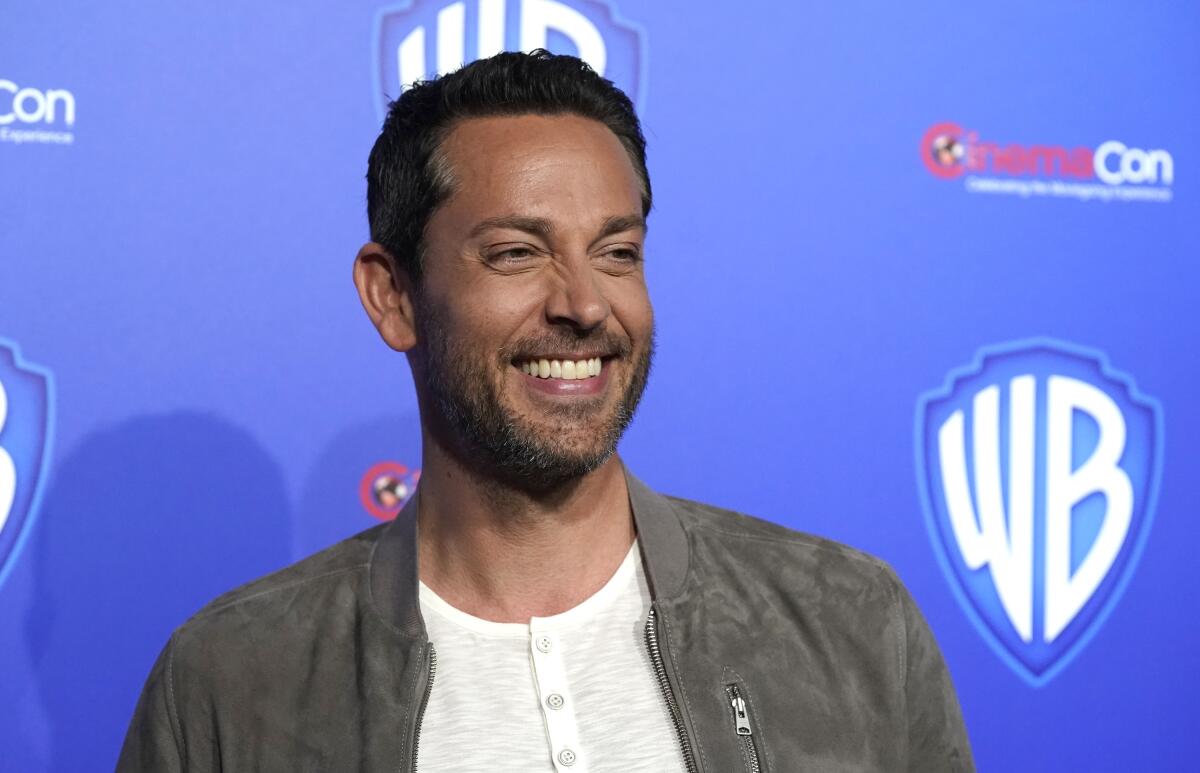
Zachary Levi is planning to create a new kind of studio system in Texas.
(Chris Pizzello / Invision / AP)
“I really felt this … calling on my life to go and build what is essentially a new version in the lineage of United Artists,” he said. “That allows the artist to really take the power back, take their destiny back.”
But for all the activity, there was no getting around the math. If Texas did not pour resources into a substantial rebate program, it would continue to lose out.
The challenge was to convince the conservative Legislature that an incentive program was not simply a Hollywood handout.
Thus began a campaign in spring 2023 with Texas voices advocating for a strong film industry.
That May, “Good for Texas,” the video precursor to “True to Texas,” showcased Lone Star-born actors such as McConaughey, Quaid, Owen Wilson, Powell and others in support of increased incentives.
Filmmaker Chase Musslewhite, a sixth-generation Houstonian who was one of the video’s producers, said she was motivated to get involved when she lost funding for her first feature after her financier opted to shoot in Louisiana.
She joined forces with Grant Wood, a Midland native, who had studied film and ran a Dallas start-up, to launch the Media for Texas advocacy group.
“We wanted to help get the film community aligned and put forth one bill with one idea to make it as easy as possible for the Legislature to push for it,” Musslewhite said.
The Texas Film Commission painted a rosy picture, saying that for every dollar invested in the incentives, Texas received $4 of new money into the economy.
A pivotal moment arrived in late summer 2024. Media for Texas co-hosted a private screening of the film “Reagan,” starring Dennis Quaid, with Patrick at Austin’s Bullock Texas State History Museum. A number of state legislators attended.
Patrick took to the podium and announced his aim to “make Texas the media capital of the world,” Musslewhite recalled.
That was the push people needed, Musslewhite said.
Last October, Patrick convened a special hearing of the Senate Finance Committee, where a new bill for a robust film incentive was front and center.
Patrick marshaled McConaughey, Harrelson, Quaid and Sheridan to support him. Joining the effort was billionaire Ross Perot Jr.

Dennis Quaid, second from left, standing next to Lt. Gov. Dan Patrick, looking up, at the Houston Livestock Show and Rodeo in March, is one of the many prominent Texas-born Hollywood actors and filmmakers to rally around film incentives.
(Cassie Stricker / Houston Livestock Show and Rodeo)
During the hearing, a denim-clad Quaid voiced his support. “I, for one, feel that the world is beginning to turn right side up again and common sense prevails, and I’d like to see that reflected in our films and entertainment.”
When Sheridan spoke, he expressed regret that his 2016 film “Hell or High Water,” a story of two bank-robbing brothers trying to save their Texas family ranch, had to shoot in New Mexico because of its subsidies.
“No one will be here without the incentives,” the filmmaker said.
During the last stretch before the vote, McConaughey, in a cowboy hat, made a final overture to legislators in March.
“If we pass this bill, we are immediately at the bargaining table for shooting more films and TV and commercials in our state,” he said. “That is money that’s going to local Texas restaurants, hotels, coffee shops, dry cleaners, street rentals, home rentals ― even Woody’s barber,” in a nod to Harrelson, who was also in attendance.
The high-profile campaign worked. Two months later, the bill passed in the Senate with a 23-8 vote, and by June it had become law.
A slippery slope?
Nonetheless, concerns remain about the program.
For one, the bill, which emphasizes a positive portrayal of the state, does not specifically address whether a film or show that has themes such as abortion, gun control or LGBTQ+ characters will receive funding.
In 2010, then-Gov. Rick Perry’s administration yanked funding for the Robert Rodriguez film “Machete” over concerns that the movie portrayed Texas negatively.
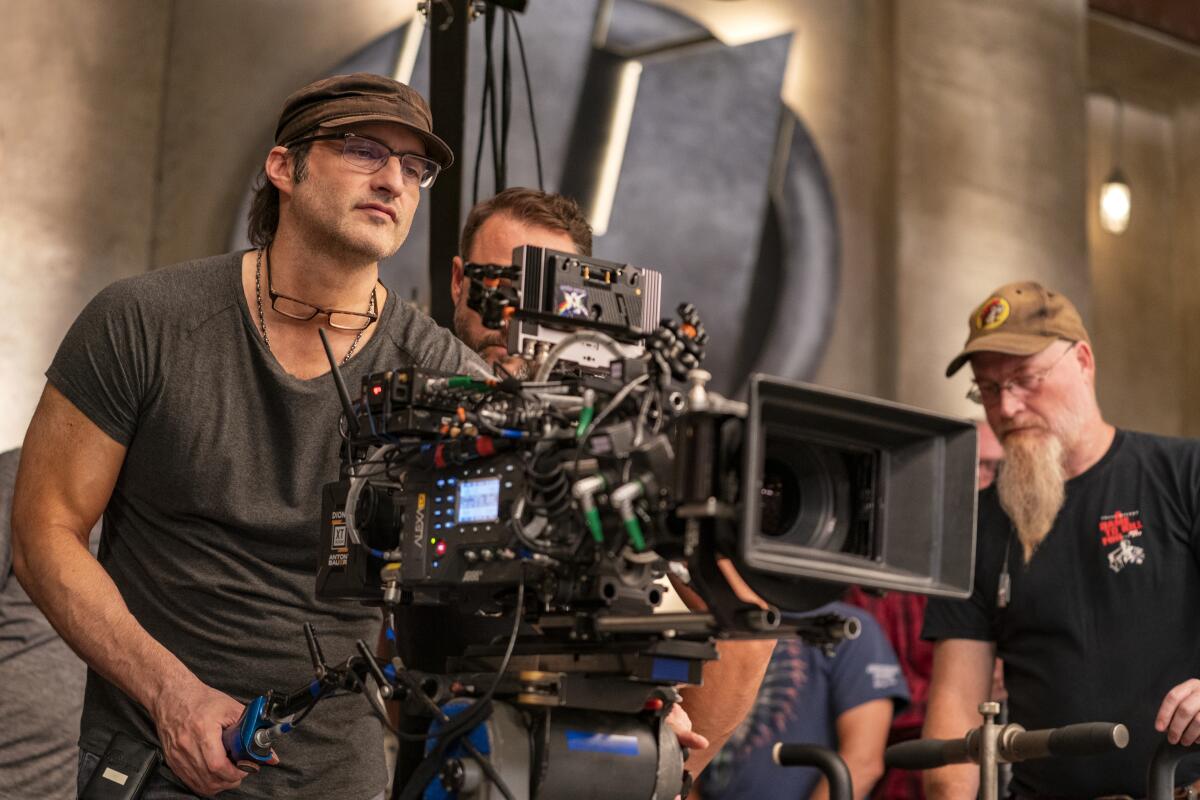
Funding for Robert Rodriguez’s film “Machete” was denied over concerns it portrayed Texas negatively.
(Ryan Green / Netflix)
George Huang, professor of screenwriting at UCLA School of Theater, Film, and Television, cautioned this could be “a very slippery slope.”
“I understand that with incentives you don’t want to appear to fund controversial subjects,” he said. “But where do you draw the line on censorship? Who in the governor’s office is the arbiter of good taste?”
Many inside the Texas film community stress that these are still early days and believe the film office will ultimately take a case-by-case approach.
“I think that those fears are misplaced, because the opportunity for what Texas can provide to the country and to the world outweighs the risk,” Musslewhite said.
For now,the Texas film community is elated.
“Texans kind of warmed up to the idea that if an industry were to grow in Texas, it doesn’t have to look exactly like it looks in some of these other places,” Strayer said. “I think they came to realize that you can kind of write your own rules.”
And what’s more Texan than writing your own rules?

